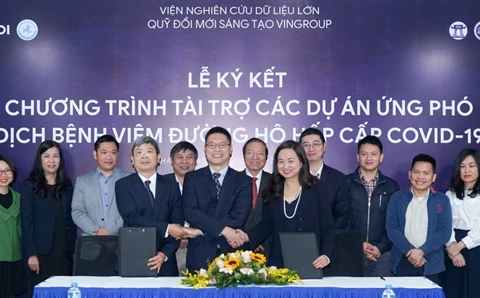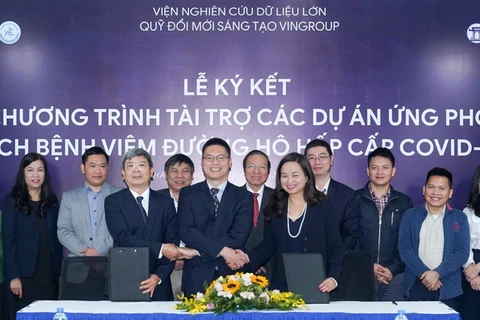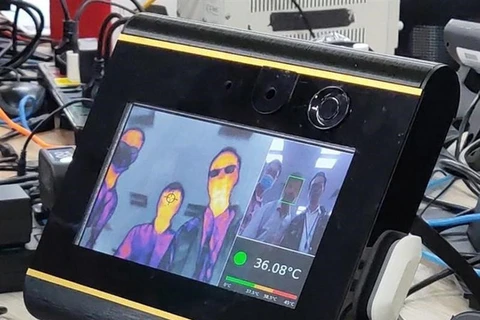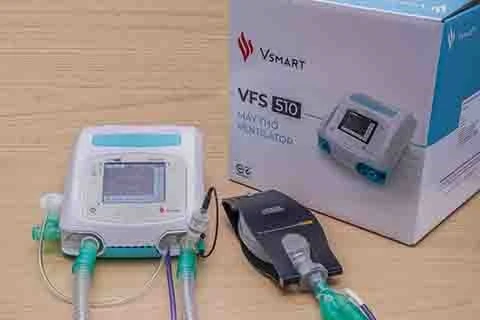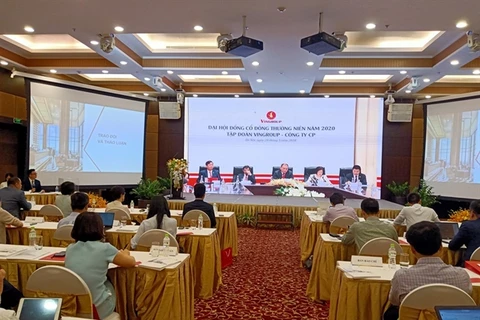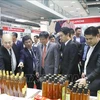Hanoi (VNA) – As the COVID-19 pandemic is ravaging around the globe, Vietnam’s outstanding performance in the fight against the coronavirus has attracted great attention from international media.
The following article, recently published on Bloomberg, focuses on a major Vietnamese firm’s plan in the face of the pandemic.
The coronavirus pandemic largely leapfrogged Vietnam – the country has reported just 332 cases and no deaths – but from his sprawling headquarters in Hanoi, billionaire Pham Nhat Vuong could see a need beyond the border. In April, the country’s richest man surveyed his cradle-to-grave conglomerate and made a decision. He was getting into ventilators.
In the worst cases of COVID-19, the virus attacks the lungs, making it harder to get oxygen to the bloodstream. A ventilator can be the difference between life and death, and there aren’t enough of them.
By one estimate, the world’s hospitals could use another 800,000.
[Vingroup completes design of two ventilator models for COVID-19 treatment]
The shortage is most acute in the developing world – South Sudan, for example, has just four ventilators for a population of 12 million – but the world’s richest country is short, too. After reports that some hard-hit New York City hospitals had jury-rigged ventilators to serve two patients at the same time, President Donald Trump compelled automakers and other US companies to start making the devices. Ford Motor Co. and General Electric Co. teamed up to deliver 50,000 ventilators by July 13 in a 336 million USD government contract.
Vuong said he believes his company, Vingroup JSC, can do it faster and for less money. Using an open-source design from device maker Medtronic Plc, Vingroup submitted a working ventilator for regulator approval in mid-April. While the company waits for Vietnam’s regulators to give the go-ahead, ventilators are rolling off the assembly line.
Vingroup’s ventilators cost around 7,000 USD in Vietnam, 30 percent less than Medtronic’s own model. The company also says it could produce as many as 55,000 a month as soon as the government approves them and plans to export them wherever there’s demand. Vingroup said it’ll donate several thousand to Ukraine and Russia, where Vuong has long-standing business ties.
“For the time being, we will focus on producing lots of ventilators – and doing it really well,” said the 51-year-old Vuong, who shared his plans over the course of a few months in a rare interview at Vingroup’s Hanoi headquarters and in a series of emails. “We want to join hands with the Vietnamese government to solve a part of the pandemic problem.”
While Vingroup runs a handful of hospitals and clinics, being a medical device manufacturer hadn’t been on the agenda. But Vuong is known for an ambition that dovetails Vietnam’s own. So when the country pushed domestic manufacturers to make more sophisticated products, Vingroup started making cars and smartphones.
Now, as the government gives away cases of made-in-Vietnam face masks to virus-hit countries overseas, Vuong is making ventilators part of an even more ambitious global campaign: selling Vietnamese cars to the world.
In December, he announced that VinFast, the conglomerate’s automotive group, would develop an electric vehicle and export it to the US by 2021. Vuong is pledging 2 billion USD of his own fortune to make the improbable feat happen.
Whether Americans would consider a Vietnamese car remains an open question. Ventilators, on the other hand, are a product the virus-stricken world can’t turn down. “The lesson we learn from a crisis is that there will always be lots of opportunities,” said Vuong. “We have to make the right choices and act fast.”
Over the past two decades, Vietnam has become one of the world’s fastest-growing economies. Average annual incomes have grown more than sixfold, and even pre-pandemic, Vuong fixated on building a company fast enough to keep up with the country’s growing middle class. Today the Vingroup umbrella covers dozens of businesses that touch Vietnamese from childhood through senescence.
A baby can be born in a Vinmec hospital, grow up in a Vinhome, attend a Vinschool and go on to VinUniversity. A family might drive a VinFast car through a community designed by Vingroup’s master planners en route to a vacation at a Vinpearl resort. In their everyday lives, they can talk on VinSmart phones and shop for international brands at Vincom malls.
For Vietnam’s leaders, Vuong and Vingroup are a testament to the country’s progression from a socialist economy to a market-oriented one. The government has applauded Vingroup’s growth and success as part of Vietnam’s modernisation. When VinFast’s first car rolled off the assembly line, Prime Minister Nguyen Xuan Phuc declared it “a great day for Vietnam.”
What Vuong and Vietnam’s top leaders crave is international recognition, particularly in the US, the country’s onetime enemy and the world’s biggest economy. Many Americans, Vuong acknowledges, still see Vietnam as a “poor, backward country where it’s impossible to have modern and high-tech products.” The successful global introduction of a Vingroup product – whether it’s a car or a ventilator – could change the way the world sees Vietnam.
“We want the company to tackle things that people think are relatively difficult, things that Vietnamese private enterprises have not done successfully,” he said. “It’s our mission and responsibility to develop a Vietnamese brand with a world-class reputation.”
 Technical personnel check the operation of ventilators at a VinSmart factory outside of Hanoi (Source: Bloomberg)
Technical personnel check the operation of ventilators at a VinSmart factory outside of Hanoi (Source: Bloomberg) Ventilators may prove a strategic introduction to the global market. If Vingroup can pull off production at the scale Vuong’s anticipating, it will be addressing a worldwide shortage, leveraging on Medtronic’s brand as a well-established medical device maker. And if the ventilators work the way they’re supposed to, Vingroup will have proven its ability to deliver a complicated, reliable, life-saving device – not a bad bona fide for an aspiring carmaker.
The company configured its first ventilator assembly line in less than a month, customising three rows of conveyor belts in its seven-month-old smartphone factory. Engineers from the company’s VinFast car unit worked on the design of the device, and representatives from Medtronic are advising workers who were making smartphones and TV panels a few weeks ago.
“There are very few companies in the world like it,” said Mark Mobius, founder of Mobius Capital Partners LLP. He’s been investing in Vietnam for the past decade and has private equity investments in the nation. “The ambition is astounding. It would be a huge win – to make Vietnam a global player.”
Vuong said his plans for global expansion have only been emboldened by current events. Vingroup still anticipates hiring a few hundred engineers to expand the research and design centre in Australia that will develop VinFast’s next car models and EVs. The company is reportedly interested in acquiring some assets of the soon-to-be-defunct Australian automaker Holden.
“He seems to be zigging when other EV startups are zagging,” said Michael Dunne, chief executive officer of automotive consultant ZoZo Go, which focuses on the Asian market. “He has sky-high ambitions. But then there are reality checks.”
Dunne said Vuong has echoes of another automotive titan - Li Shu Fu, head of China's biggest private carmaker Geely Automotive Holdings Ltd. Best known for acquiring Volvo from Ford in 2010, Li has become the dominant force in China’s car market. And, like Vuong, he’s declared his American ambitions. In 2006, he announced plans for Geely to export cars to the US. More than a decade later, neither Geely nor any other Chinese car brand has done so.
“The ongoing businesses now are the ones with the biggest potential. We won’t change our business strategy,” said Vuong. “If the global recession is severe, we can adjust some of our short-term plans.”
Vuong has the confidence of someone who’s grown very rich reading and shaping consumer desires. In his earliest success, he sold Vietnamese instant soup noodles in Ukraine, where he settled after a college scholarship took him to Moscow. To convince a population raised on borscht and dumplings to love just-add-water soup, he hit the malls, did cooking demonstrations and gave away hundreds of free samples.
“At the end of the day, we convinced the Ukrainian consumer,” said Vuong. The business became a household staple in the Eastern European state, and Nestle SA eventually acquired it for an estimated 150 million USD.
In 2000, Vuong returned to Vietnam with his noodle profits and found nothing but opportunity. “The infrastructure was too outdated compared to the world. Hanoi only had a few high-rise buildings and five-star hotels,” he said. “I had the money. If I invested and couldn’t earn anything back, my thought was, at least the city would have big, nice buildings.”
Within three years, he opened Vietnam’s first upscale hotel, the Vinpearl Resort & Spa on Hon Tre Island, connected by a two-mile gondola to the seaside city of Nha Trang. The grounds include Vietnam’s first water park and an 18-hole golf course.
He started a real estate company – later merged to become Vingroup – and began building modern condominiums with supermarkets, schools and malls. Last year, the residential real estate arm sold 10,000 apartments in 17 days at its Vinhomes Grand Park, a canyon of riverside residential towers in the commercial hub of Ho Chi Minh City. The development encircles Landmark 81, Vietnam’s tallest skyscraper, also a Vingroup property.
Vuong announced his plans to build and sell cars in September 2017. Nine months later, he debuted his plans for a smartphone unit, VinSmart. The breadth of ambition and speed of execution has staggered observers and, often, partners.
VinFast introduced three new combustion vehicles last year and says it received more than 17,000 orders. In November, it plans to debut its first electric vehicle, a crossover SUV, at the Los Angeles Auto Show in November.
The batteries, built with cells from LG Chem, give the car a 500 kilometre (310 mile) range on a single charge, about 15 percent less than Tesla’s Model S. Meanwhile, local media have spotted another VinFast EV prototype, a two-door coupe, on the streets of Hanoi. The company says it plans to test them widely this winter and start selling them by the summer.
Vingroup’s plan to export electric vehicles to the US in 2021 or 2022 is “not realistic,” said Dunne. US safety, environmental and regulatory approvals typically take at least two to three years, and it’s not clear whether Vingroup’s begun the process. The US Environmental Protection Agency declined to comment on whether the company has filed any of the necessary paperwork.
There are more questions, all with potentially expensive answers. Tesla Inc., which leads the American pack of electric carmakers, has yet to make an annual net profit. A slew of Chinese EV startups were “also caught in the same circumstances,” said Dunne. “You just don’t step into the US market and do it quickly.”
Vuong doesn’t deny the risk, saying “any company can collapse.’’ He said the conglomerate has run contingency scenarios in case of a real estate meltdown like the one in 2009 and continues to plan for divestments across the group. So far, the property market is expected to grow slightly this year, with Vingroup also now developing industrial parks that are expected to be in demand as manufacturers move into Vietnam from China.
And to those who doubt his EV ambitions, Vuong pointed out that VinFast turned a swamp into a state-of-the-art automotive factory, complete with fully-automated robotic production lines, and delivered a car in 21 months – another feat few thought was attainable until it happened.
For now, the phone factory will redeploy some of the same metals, plastics and silicon semiconductors to make ventilators. About 70 percent of the materials are sourced locally, Vingroup says, and it can tap an already vast supply chain. Just 85 workers are producing an initial 160 ventilators a day as the company awaits final approval from the government to ramp up manufacturing.
Vingroup’s two ventilator models have met initial technical standards, and clinical trials are under way, according to Nguyen Minh Tuan, who heads the department at the health ministry that is regulating the ventilators. He said Vingroup should get approval to mass produce the ventilators once the results of the clinical trials come in this month.
Vuong said the current price of the ventilators is less than what it costs to make them. “The purpose of ventilator production is completely about contributing to society at this critical time,” he says. It’s also temporary. “We have no plans to expand into this segment.”
Vuong said he identifies as a patriot above all else, and he wants his company to keep adding to the list of firsts for Vietnam. “I always tell my colleagues: don’t let your life pass by without meaning,’’ he said. “Don’t let it be that at the end of your life, you have nothing that’s worth remembering or retelling. It would be a miserable ending to see that your life didn’t add any value.”/.






